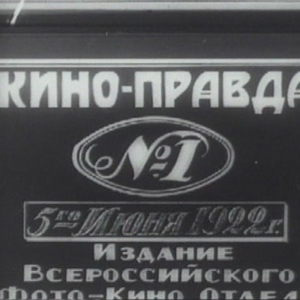
ACFNY SUPPORTED | FILM RETROSPECTIVE | DZIGA VERTOV | Kino-Pravda nos. 9–11, 13 (“Yesterday, Today, Tomorrow”: A Film Poem Dedicated to the October Celebrations)
Kino-Pravda nos. 9–11, 13 (“Yesterday, Today, Tomorrow”: A Film Poem Dedicated to the October Celebrations) (1922, USSR)
Directed by Dziga Vertov
Silent. Approx. 90 min.
With piano accompaniment by Donald Sosin.
Intertitles of Kino-Pravda 13: Aleksander Rodchenko. Certain that he could improve upon the American adventure film, “with its showy dynamism,[…]rapid shot changes, and the close-up,” Vertov used quicksilver montage to celebrate the speed and efficiency of modern machines and man in the New Russia. In breathless images we see the opening of the racing season in Moscow; the All-Russia Olympiad, which offered Vertov a chance to experiment with what he called “a precise study of movement”; and the lightning-fast deployment of a mobile film projection unit in a Moscow square. Kino-Pravda 13 is famous for Aleksandr Rodchenko’s Constructivist intertitles, a masterpiece of graphic design, and the images themselves are also astonishing: the funerals of revolutionary heroes from 1917–1922, some excerpted from Kino-Week, that Vertov strung together to create what Yuri Tsivian calls “some kind of simultaneous, over-arching funeral in which the whole country is participating.”
ABOUT THE RETROSPECTIVE
Of all the masters of Soviet cinema—most notably Sergei Eisenstein, Lev Kuleshov, Vsevolod Pudovkin, and Grigori Aleksandrov—Dziga Vertov (né Denis Arkadievitch Kaufman, 1896–1954) is arguably the one whose still-radical experiments in image and sound, and enduring influence among an astonishing range of contemporary filmmakers and artists, from Jean-Luc Godard to Richard Serra to Steve McQueen, have yet to be fully appreciated or celebrated.
In close collaboration with the Austrian Cultural Forum New York and the Austrian Film Museum, MoMA has launched this retrospective, the most comprehensive ever assembled in the United States, and seeks to redress this with an extensive selection of Vertov’s silent films, sound features, and related work by collaborators and rivals in what Vertov called his “factory of facts.”
This screening is one of 11 programs of Vertov’s silent films, drawn primarily from the Austrian Film Museum’s unparalleled collection, including the premieres of fourteen Kino-Week films from 1918–19, and, for the first time together, all of his extant Kino-Pravda films from 1922–25. The retrospective continues with such masterworks as Stride, Soviet! (1926), A Sixth Part of the World (1926), The Eleventh Year (1928), Enthusiasm: Symphony of the Donbass (1930), Three Songs of Lenin (1935/38), and other sound films. Vertov’s exhilarating body of work must be seen not as a succession of individual films, but as one continuously evolving movie; “free of the limits of time and space,” he wrote, it would lead to “a fresh perception of the world” and a revolutionary passage from the Old to the New.
All films directed by Vertov, except where noted, and with simultaneous English translation or electronic subtitles. Screening descriptions adapted from texts by Yuri Tsivian and others, principally from the 23rd Pordenone Silent Film Festival catalogue.
VENUE
The Museum of Modern Art
Theater 2 (The Roy and Niuta Titus Theater 2), T2
11 West 53 Street
New York, NY 10019
www.moma.org
Film admission tickets can be purchased in person only. Museum members may reserve screening tickets online.
Please visit http://www.moma.org/visit/calendar/film_screenings/12164

